BACK
Updates from Sophie
December, 2019
Thanks to the generous Riley's Way Call for Kindness grant we received, we are able to promote STEM learning and nutrition workshops in the classroom. When the weather gets cold, our teen volunteers head inside to provide free STEM workshops at the local low-income daycare facilities where we plant vegetable gardens in the spring and summer. Our teen volunteers aim to focus on promoting STEM learning through exploration of the in-door gardening process with young children. Our goals is to promote STEM learning in the early years through, play, and building curiosity about the natural world and the way things work. Our programs and workshops aim to make youth better problem-solvers and interested in science and nature.
We have over 60 teen volunteers that help us plan and lead our fall and winter STEM and nutrition workshops. One of our favorite activities this month with both the pre-school children and our teen volunteers was making guacamole. Not one of the pre-school students could identify the avocado before the program, nor had they ever tasted guacamole. Jamal, age three, stated “I really like the green food” Anika shared that she thought “it looked like slime.” We even sang a song about avocados.
We showed the children how to make guacamole and explained the benefits of eating healthy fats. We then saved the seeds to demonstrate how to grow a grove of avocado trees. We rinsed an avocado seed with water and let it sit for a day or two until dry, then the volunteers removed the brown papery cover to expose the seed. We showed the students how the root system forms and a green shoot appears, and then we all planted the seeds in soil and watch it grow as a indoor plant.
We also rely on heavily on children’s books that we borrow from the local library to read about gardening, We Incorporate books about insects, nature and science. We use STEM words during reading time to build vocabulary. We ask preschoolers if they can spot a tomato plant, or a ladybug or butterfly. Our goal is to lay the foundation for addition and subtraction by counting with the young children using pictures of a variety of fruit and vegetables.
Observing is important in science. Our volunteers encourage the the pre-schoolers to draw vegetables and fruits they observe and to describe what they see. We play “I spy” to give students the opportunity to observe the world around them. Through “I spy,” we can help the young children build an understanding of what objects occur in nature and what objects are man-made. We discuss the weather and read books on weather that explain rain, snow and clouds. We ask the students about how weather impacts the gardens. We listen to the young children and encourage them to ask questions. The teen volunteers enjoy spending time with the young children and helping them learn about science and gardening. The teen volunteers and myself have learned that even the smallest act of caring and demonstration of kindness can make a huge impact.
We are so appreciative of the Riley's Way Call for Kindness grant. The grant has helped us build 25 new raised garden beds, plant 35 gardens and provided funding for our workshops and programs. Kindness is realizing that we can all make a difference when we aim to help others and bring about positive change in our community.
July, 2019
If you happen to pick the hottest of St. Louis days in early summer to build and plant a new garden at a local daycare, like we did this weekend, you might step back and truly appreciate all the hard work. I wipe off the sweat from my brow and welcome the opportunity to write a blog about the incredible experience to promote kindness as a recipient of a Riley's Way Call for Kindness grant in the comforts of nice cool air conditioning.
Hunger is a global problem, yet it can be solved. Thanks to the generous grant funding from Riley's Way to promote kindness in the community, we are taking on the challenge locally in the St. Louis and Kansas City region and fighting hunger, malnutrition, and promoting nutritious and healthy eating in our community. The world currently produces enough food to feed everyone. Our own nation produces enough food so that even in our country, nobody should struggle with hunger. Many people in the world do not have sufficient income to purchase food or the land to grow enough food. However, gardening can make a huge difference in fighting hunger with even small spaces and community gardens. The funding from Riley's Way helps us reach more children in low-income communities by growing gardens and providing STEM and nutrition workshops at their daycares. Small children are endlessly fascinated with plants and the growing process. Homegrown tomatoes or raspberries straight off the bush are amazing treats for teen volunteers and the young children who have put in the effort to grow them.
Our goal is to teach young children and teen volunteers about the nutritional benefits of what they grow so they all become knowledgeable about making healthier food choices for life. Organic gardening helps ensure that we know the source of the food. Youth can and do make a vital difference in my community by growing vegetable gardens to fight hunger and promote healthy eating. As avid gardeners in our community, we donate, build, plant and maintain 45 raised vegetable garden beds at low-income daycares located in food deserts in the St. Louis and Kansas City Metropolitan region. Initially, we reached out to our peers and invited them to volunteer with us this past weekend to help grow vegetable gardens and lead STEM and nutrition workshops.
This weekend over 75 youth from area high schools helped us plant vegetable gardens at three low-income daycare sites. We worked all day this past Saturday in the scorching hot sun to plant the gardens and interact with young children at their daycare sites. We invited the young children from the daycare center and their families to join us to help plant the gardens. The purpose of our project is to ultimately donate the fresh healthy produce to families-in-need and to area food banks while engaging young children in understanding the basics of plant science and promoting healthy eating.
Our goal is to also activate and energize youth volunteers in the St. Louis region to give back to the community. Teaching young children about the basics of botany and photosynthesis and the many ways plants attract pollinators as well as the importance of nutrition gives young children a foundation for growing sustainable vegetable gardens. These gardens provide a hands-on opportunity for low-income children and their families to learn and understand the importance of sustainable gardening and the environmental impact it makes on our community.
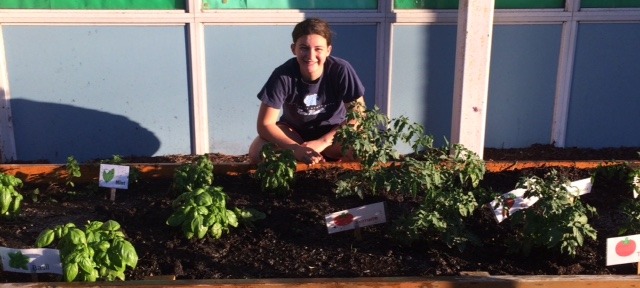
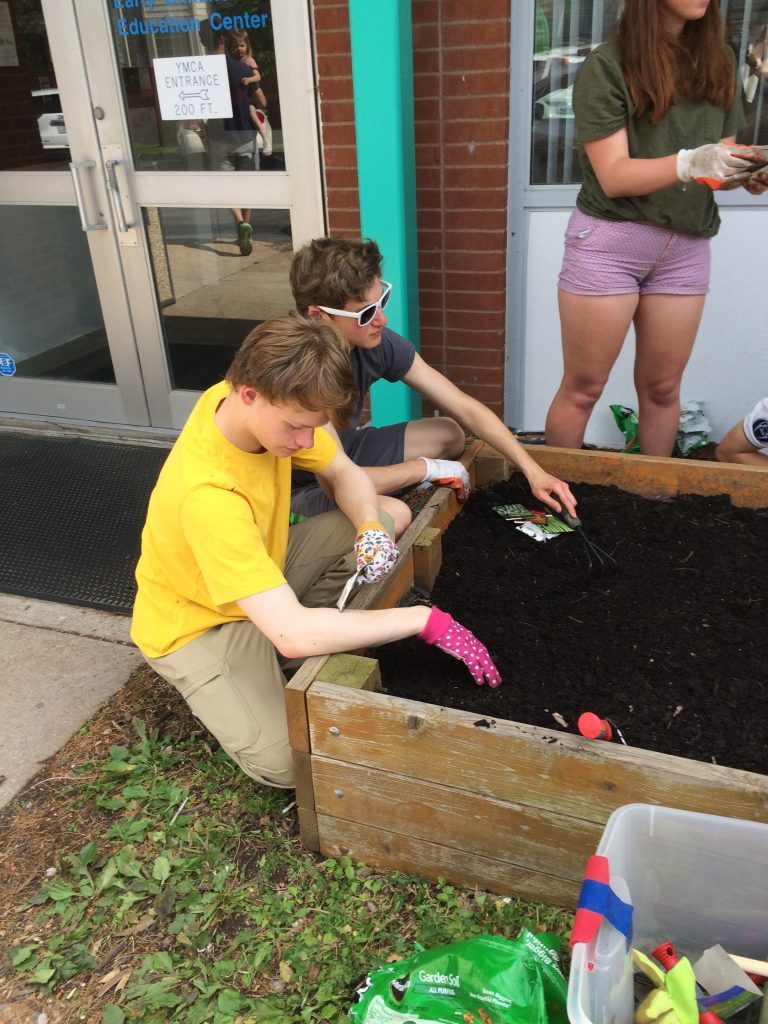
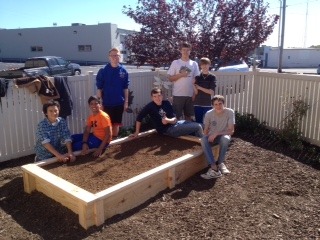
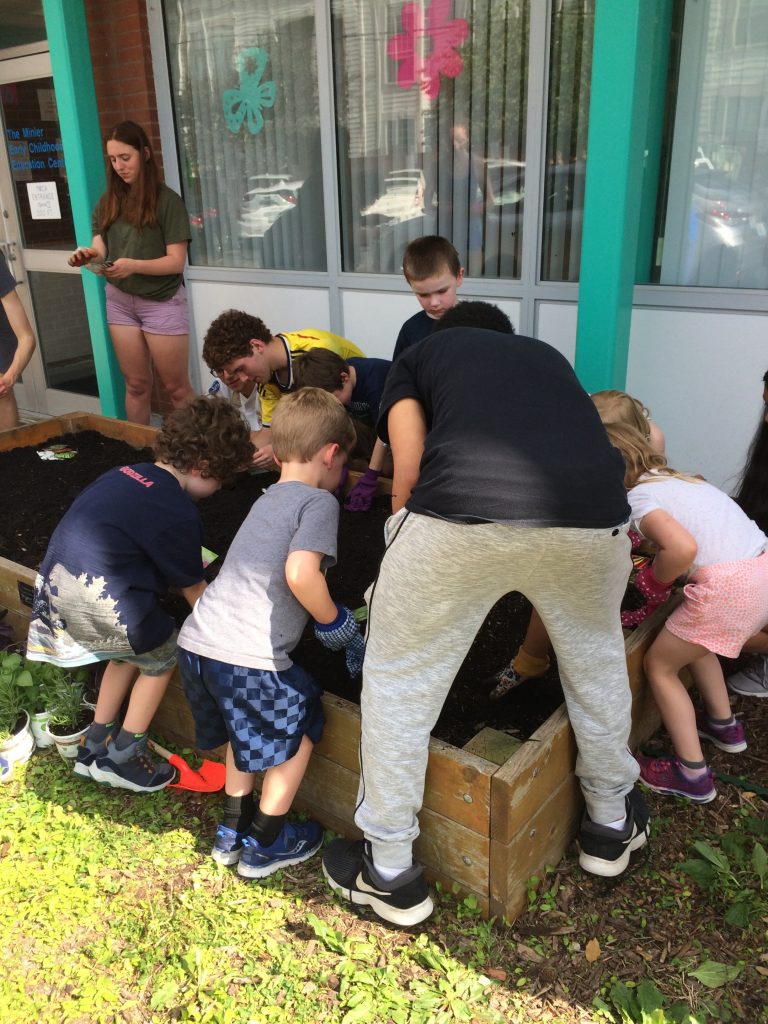
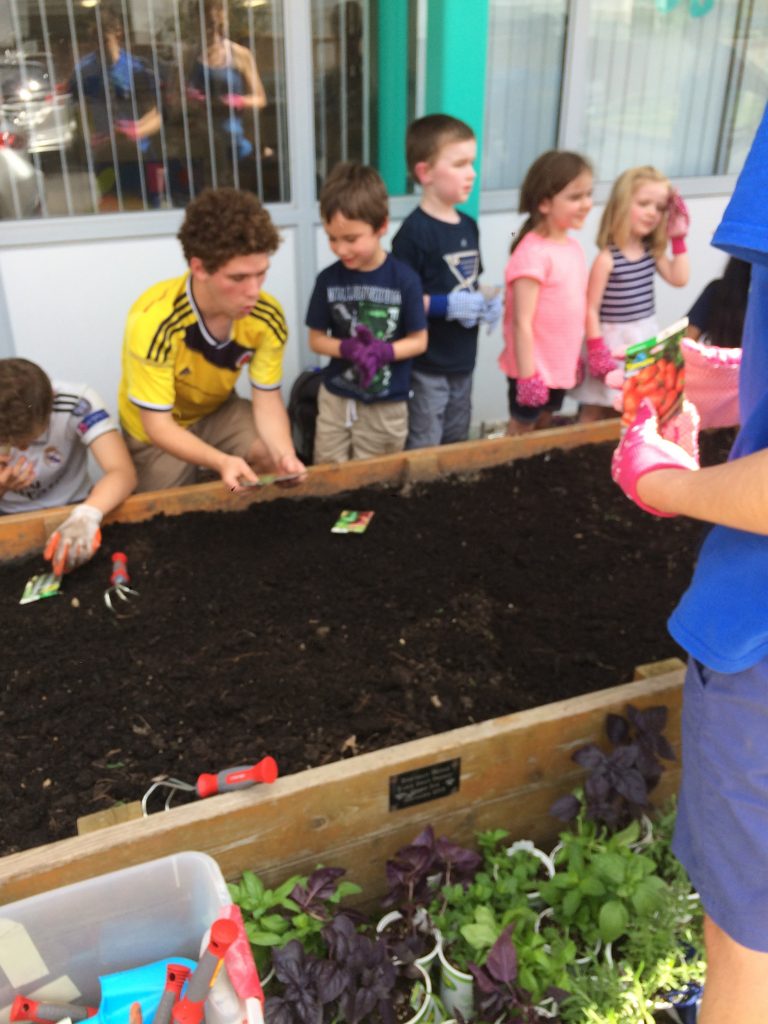
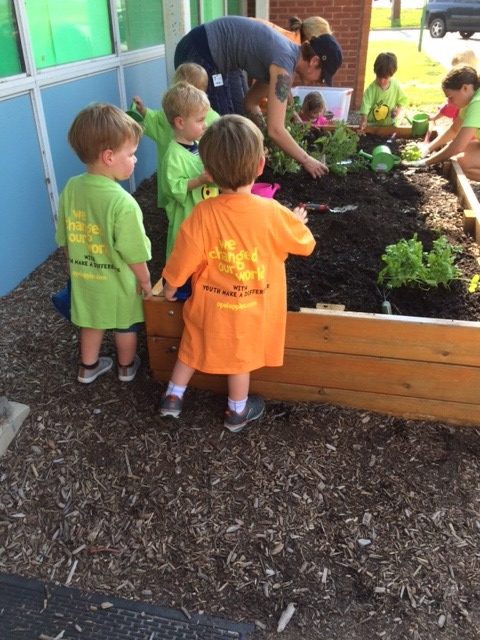
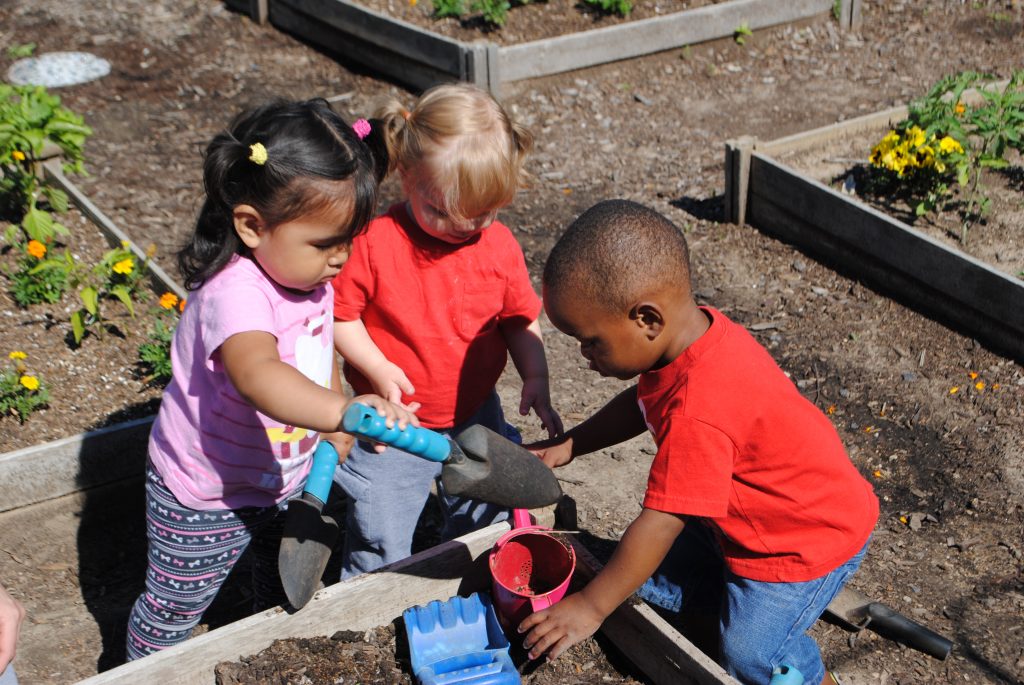
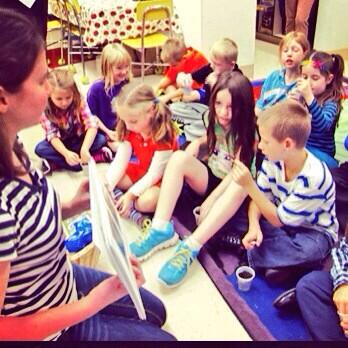
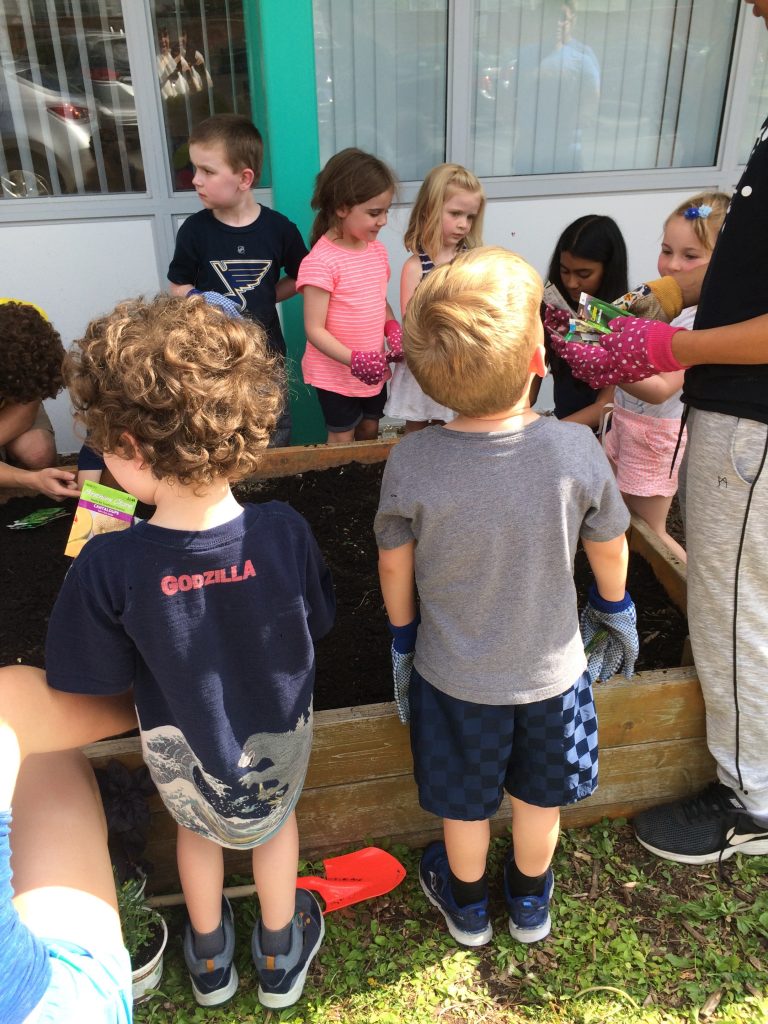
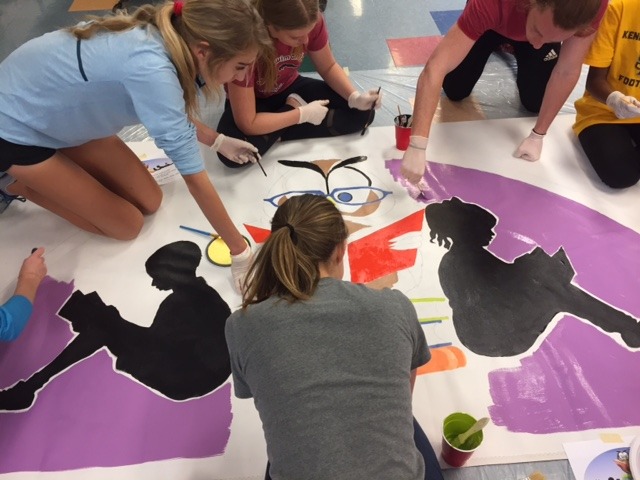
Existing Project
Grow Healthy
Sophie Bernstein
Missouri
Grow Healthy, a gardening project of volunteennation.org, is a youth-led initiative to build, plant, maintain, and grow healthy fresh vegetables at low-income St. Louis and Kansas City daycares, pre-schools and shelters while providing a hands-on learning laboratory and STEM workshops for young children. Currently, they have 45 organic sustainable vegetable gardens, have donated over 45,000 pounds of produce to food banks from the gardens, and recruited 852 youth including at-risk teens to help in the gardens. Sophie will use the funds to expand the project by adding eight to ten new raised vegetable gardens to low-income daycare sites.
December, 2019
Thanks to the generous Riley's Way Call for Kindness grant we received, we are able to promote STEM learning and nutrition workshops in the classroom. When the weather gets cold, our teen volunteers head inside to provide free STEM workshops at the local low-income daycare facilities where we plant vegetable gardens in the spring and summer. Our teen volunteers aim to focus on promoting STEM learning through exploration of the in-door gardening process with young children. Our goals is to promote STEM learning in the early years through, play, and building curiosity about the natural world and the way things work. Our programs and workshops aim to make youth better problem-solvers and interested in science and nature.
We have over 60 teen volunteers that help us plan and lead our fall and winter STEM and nutrition workshops. One of our favorite activities this month with both the pre-school children and our teen volunteers was making guacamole. Not one of the pre-school students could identify the avocado before the program, nor had they ever tasted guacamole. Jamal, age three, stated “I really like the green food” Anika shared that she thought “it looked like slime.” We even sang a song about avocados.
We showed the children how to make guacamole and explained the benefits of eating healthy fats. We then saved the seeds to demonstrate how to grow a grove of avocado trees. We rinsed an avocado seed with water and let it sit for a day or two until dry, then the volunteers removed the brown papery cover to expose the seed. We showed the students how the root system forms and a green shoot appears, and then we all planted the seeds in soil and watch it grow as a indoor plant.
We also rely on heavily on children’s books that we borrow from the local library to read about gardening, We Incorporate books about insects, nature and science. We use STEM words during reading time to build vocabulary. We ask preschoolers if they can spot a tomato plant, or a ladybug or butterfly. Our goal is to lay the foundation for addition and subtraction by counting with the young children using pictures of a variety of fruit and vegetables.
Observing is important in science. Our volunteers encourage the the pre-schoolers to draw vegetables and fruits they observe and to describe what they see. We play “I spy” to give students the opportunity to observe the world around them. Through “I spy,” we can help the young children build an understanding of what objects occur in nature and what objects are man-made. We discuss the weather and read books on weather that explain rain, snow and clouds. We ask the students about how weather impacts the gardens. We listen to the young children and encourage them to ask questions. The teen volunteers enjoy spending time with the young children and helping them learn about science and gardening. The teen volunteers and myself have learned that even the smallest act of caring and demonstration of kindness can make a huge impact.
We are so appreciative of the Riley's Way Call for Kindness grant. The grant has helped us build 25 new raised garden beds, plant 35 gardens and provided funding for our workshops and programs. Kindness is realizing that we can all make a difference when we aim to help others and bring about positive change in our community.
July, 2019
If you happen to pick the hottest of St. Louis days in early summer to build and plant a new garden at a local daycare, like we did this weekend, you might step back and truly appreciate all the hard work. I wipe off the sweat from my brow and welcome the opportunity to write a blog about the incredible experience to promote kindness as a recipient of a Riley's Way Call for Kindness grant in the comforts of nice cool air conditioning.
Hunger is a global problem, yet it can be solved. Thanks to the generous grant funding from Riley's Way to promote kindness in the community, we are taking on the challenge locally in the St. Louis and Kansas City region and fighting hunger, malnutrition, and promoting nutritious and healthy eating in our community. The world currently produces enough food to feed everyone. Our own nation produces enough food so that even in our country, nobody should struggle with hunger. Many people in the world do not have sufficient income to purchase food or the land to grow enough food. However, gardening can make a huge difference in fighting hunger with even small spaces and community gardens. The funding from Riley's Way helps us reach more children in low-income communities by growing gardens and providing STEM and nutrition workshops at their daycares. Small children are endlessly fascinated with plants and the growing process. Homegrown tomatoes or raspberries straight off the bush are amazing treats for teen volunteers and the young children who have put in the effort to grow them.
Our goal is to teach young children and teen volunteers about the nutritional benefits of what they grow so they all become knowledgeable about making healthier food choices for life. Organic gardening helps ensure that we know the source of the food. Youth can and do make a vital difference in my community by growing vegetable gardens to fight hunger and promote healthy eating. As avid gardeners in our community, we donate, build, plant and maintain 45 raised vegetable garden beds at low-income daycares located in food deserts in the St. Louis and Kansas City Metropolitan region. Initially, we reached out to our peers and invited them to volunteer with us this past weekend to help grow vegetable gardens and lead STEM and nutrition workshops.
This weekend over 75 youth from area high schools helped us plant vegetable gardens at three low-income daycare sites. We worked all day this past Saturday in the scorching hot sun to plant the gardens and interact with young children at their daycare sites. We invited the young children from the daycare center and their families to join us to help plant the gardens. The purpose of our project is to ultimately donate the fresh healthy produce to families-in-need and to area food banks while engaging young children in understanding the basics of plant science and promoting healthy eating.
Our goal is to also activate and energize youth volunteers in the St. Louis region to give back to the community. Teaching young children about the basics of botany and photosynthesis and the many ways plants attract pollinators as well as the importance of nutrition gives young children a foundation for growing sustainable vegetable gardens. These gardens provide a hands-on opportunity for low-income children and their families to learn and understand the importance of sustainable gardening and the environmental impact it makes on our community.











